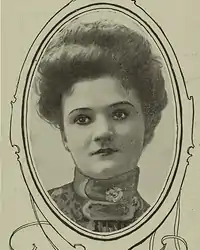Isma Dooly
Isma Dooly (1870 – May 11, 1921), also seen as Isma Dooley, was an American newspaper editor and clubwoman, based in Atlanta, Georgia.
Isma Dooly | |
|---|---|
 Isma Dooly, from a newspaper clipping, about 1900. | |
| Born | 1870 Georgia |
| Died | May 11, 1921 Atlanta, Georgia |
| Other names | Isma Dooley |
| Occupation(s) | Newspaper editor, clubwoman |
| Known for | Editor of first "woman's page" in a Southern newspaper |
Early life
Isma Dooly was born in Georgia. She was raised as the daughter of her aunt and uncle, Martin H. Dooly and Margaret "Meta" d'Laracy Dooly; both parents were born in Ireland.[1] She attended school at the Convent of the Sacred Heart in New York.[2][3]
Career
Dooly was a reporter and editor at The Atlanta Constitution from 1893 to 1921,[4][5] and edited the Woman's Department section, the first "woman's page" in a Southern newspaper.[6][7] Beyond the usual society-page topics such as corsets[8] and shoes,[9] Dooly's writing covered the war in Cuba,[6] a Japanese silent film actress,[10] automotive sports,[11] and prison conditions in Georgia.[12]
Dooly was one of the founders and leaders of the Atlanta Woman's Club, and of the Georgia Federation of Woman's Clubs.[13] She opposed the inclusion of "radical or sentimental" women in the federation's work, including suffragists and working-class women,[14] though she approved of charitable and educational efforts to improve the lives of poor and black Atlantans.[15] She served on the Board of Lady Visitors for Atlanta's public schools,[16] worked for the admission of women to the University of Georgia,[17] and was active in the United Daughters of the Confederacy.[18]
During World War I, Dooly headed the publicity department of the Georgia division of the Woman's Committee Council of National Defense.[19][20]
Personal life
Dooly died in 1921, aged 50, in Atlanta.[4] A school auditorium in Tallulah Falls was named in her memory.[17][21]
References
- "Martin H. Dooly is Dead". The Atlanta Constitution. 1902-03-12. p. 9. Retrieved 2020-08-26 – via Newspapers.com.
- Page, Elizabeth Fry (1898-11-13). "Some Notable Women in Southern Journalism: Emma Dooley". The Tennessean. p. 13. Retrieved 2020-08-26 – via Newspapers.com.
- Montgomery, Rebecca S. (2008-08-01). The Politics of Education in the New South: Women and Reform in Georgia, 1890–1930. LSU Press. p. 33. ISBN 978-0-8071-3347-7.
- "Other Obituary Notes". Fourth Estate: 3. May 21, 1921.
- Ohl, Annulet Andrews (1932-11-27). "Mrs. Ohl Tells How Social Department was Conducted Nearly 45 Years Ago". The Atlanta Constitution. p. 40. Retrieved 2020-08-26 – via Newspapers.com.
- Mahoney, Carrie S. (September 1900). "Southern Women Journalists: Miss Isma Dooly". Confederate Veteran. 8: 415.
- "Isma Dooly". The Atlanta Constitution. 1921-05-12. p. 8. Retrieved 2020-08-26 – via Newspapers.com.
- Dooly, Isma (February 1920). "Cultivating the Two Corset Habit". The Corset and Underwear Review. 14: 73.
- Dooly, Isma (July 5, 1919). "Shoe Retailers Allay Alarms of Women About Price of Shoes". Boot and Shoe Recorder. 75: 42.
- Isma Dooly, "A Japanese Woman will Star in Drama" Atlanta Constitution (May 19, 1912): c11. via ProQuest
- Bechtel, Mark (2010-02-08). He Crashed Me So I Crashed Him Back: The True Story of the Year the King, Jaws, Earnhardt, and the Rest of NASCAR's Feudin', Fightin' Good Ol' Boys Put Stock Car Racing on the Map. Little, Brown. ISBN 978-0-316-07213-7.
- Dooly, Isma (1908). "The Convict System in Georgia: 'Where Men Die Like Dogs'". Watson's Jeffersonian Magazine. 2: 544–551.
- Smith, Mary Jane (2010). "The Fight to Protect Race and Regional Identity within the General Federation of Women's Clubs, 1895-1902". The Georgia Historical Quarterly. 94 (4): 487. ISSN 0016-8297. JSTOR 41304225.
- Cyphers, Christopher J. (2002). The National Civic Federation and the Making of a New Liberalism, 1900-1915. Greenwood Publishing Group. p. 77. ISBN 978-0-275-97327-8.
- Brawley, Benjamin Griffith (May 1914). "Atlanta Striving". The Crisis: 33. ISBN 9780807133477.
- Atlanta Board of Education (1893). Annual Report of the Board of Education, Atlanta, Ga. order of the Board. p. 6.
- Sibley, Celestine (1959-06-09). "Isma Dooly--Come Home". The Atlanta Constitution. p. 15. Retrieved 2020-08-26.
- Ottley, Passie Fenton (1921-05-15). "Isma Dooly: An Appreciation". The Atlanta Constitution. p. 6. Retrieved 2020-08-26.
- National Woman's Liberty Loan Committee (1920). Report of National woman's liberty loan committee for the victory loan campaign: April 21st to May 10th, 1919. Govt. print. off. p. 109.
- Clarke, Ida Clyde Gallagher (1918). American Women and the World War. D. Appleton. p. 254.
- "Miss Dooly's Photograph Sent to Tallulah". The Atlanta Constitution. 1926-02-14. p. 39. Retrieved 2020-08-26 – via Newspapers.com.
External links
- Isma Dooly at Find a Grave
- An 1884 photograph of Isma Dooly with other teenaged girls, in the Atlanta History Photograph Collection.